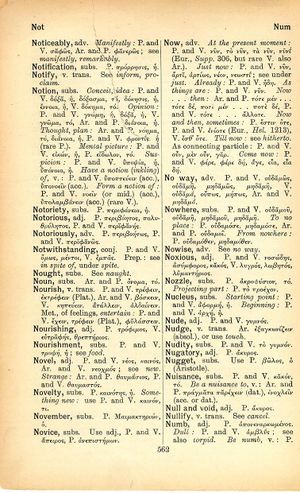nucleus
Μεγάλοι δὲ λόγοι μεγάλας πληγὰς τῶν ὑπεραύχων ἀποτίσαντες γήρᾳ τὸ φρονεῖν ἐδίδαξαν → The great words of the arrogant pay the penalty by suffering great blows, and teach one to reason in old age
English > Greek (Woodhouse)
subs.
Starting point: P. and V. ἀφορμή, ἡ. Beginning: P. and V. ἀρχή, ἡ.
Latin > English (Lewis & Short)
nū̆clĕus: (nŭcŭlĕus), i, m. for nuculeus, from nux,
I a little nut.
I Lit.
A A nut; applied also to fruits resembling a nut: nucleus amygdalae, Plin. 15, 13, 12, § 42: avellanae, id. 37, 4, 15, § 56: pinearum nucum, id. 15, 10, 9, § 35; cf. pineus, Cels. 2, 22.—Prov.: e nuce nuculeum qui esse vult, frangit nucem, he who would eat the kernel of a nut breaks the nut, i. e. he who desires an advantage should not shun the labor of earning it, Plaut. Curc. 1, 1, 55: nuculeum amisi, retinui pigneri putamina, I have lost the kernel and kept the shell, id. Capt. 3, 4, 122.—
B The hard, uneatable kernel, the stone of fruits: nuculei olivarum, Plin. 37, 11, 73, § 188: persicorum, id. 23, 7, 67, § 132: cerasorum, id. 23, 7, 72, § 141: lignosus nucleus, id. 13, 19, 34, § 112: acini, id. 23, 1, 9, § 13.—
II Transf.
A The kernel, the inner part, inside of a thing: nucleus gallae, Plin. 24, 4, 5, § 10: myrrhae, id. 12, 16, 35, § 70: allii, id. 19, 6, 34, § 111: conchae, pearls, id. 9, 35, 55, § 111.—
B The kernel, i. e. the hardest, firmest, most solid part of a thing: pinguitudinis (terrae), Plin. 17, 6, 4, § 42: ferri, id. 34, 14, 41, § 144; 36, 25, 62, § 187: insuper ex testā nucleus inducatur, Vitr. 7, 1.

